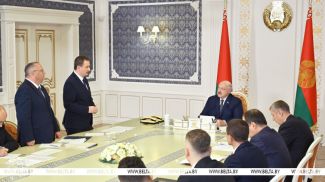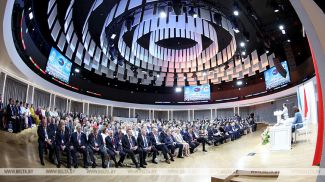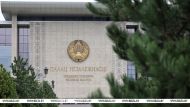MINSK, 10 November (BelTA) – Plans to streamline the work of the Social Security Fund and measures to increase support for pensioners and disabled children were in focus of the meeting hosted by Belarusian President Aleksandr Lukashenko on 10 November, BelTA has learned.
Labor and Social Security Minister Irina Kostevich was the keynote speaker. Attending the meeting were also Deputy Prime Minister Igor Petrishenko who oversees social security matters, Deputy Head of the Belarus President Administration Maksim Yermolovich, Finance Minister Yuri Seliverstov, Minsk Mayor Vladimir Kukharev and Minsk Oblast Governor Aleksandr Turchin.
“Our today's conversation will focus on proposals to bring some improvements to our social security system, the economic sector and the overall system of government in our state. Perhaps, this is not the biggest and not the most important matter when it comes to streamlining the system of administration. However, this matter is crucial for ensuring social security, providing social services. Indeed, it concerns the most vulnerable groups. These are people of retirement age, people who have found themselves in a difficult situation and need our help to get out of it. Some of them have got sick, some have disabilities and so on,” Aleksandr Lukashenko said.
He noted that the meeting will revolve around the work of the Social Security Fund: “There are proposals to streamline the work of the fund and related structures that are closely related to the fund because they provide services to population groups that I have mentioned. When some improvements are suggested, I always ask this question: is it really necessary to do it, what prompted you to bring up this issue and what is the essence of the proposals and the root cause of the problem? This does not mean that we should not improve the government structure, individual areas, industries. I have already spoken about this, this must be done through upgrading the system instead of breaking it. But this should be done only if it is really needed. Therefore, the first question to be answered is: do we need to recalibrate the Social Security Fund and other structures that assign and pay pensions, allowances, and so on. Is it necessary?”
With regard to pension benefits, it is proposed to delegate all the responsibilities related to pensions to the Social Security Fund. The proposal is also debatable.
The president outlined the time frame for introducing certain innovations. If they are really needed, then this should be done more quickly, without stretching the work in stages for several years: "If we are convinced that this system will take root in the future, then why divide this work into 5-10 stages and improve this system within 5 or 7 years. You catch my drift. If we are convinced of this, then let's do it in two steps. The first step – launch the work on 1 January next year. The second step is from the middle of next year. If we are sure about it. There is no need to prolong the processes. If we can do it faster, then let's do it."
"This is why we have gathered to discuss this issue. The most important thing is to answer the question: should we go for it or not, what are we lacking. Well, we have a system in place. People are used to it. What will this improvement give us?" Aleksandr Lukashenko noted.
Among the proposals is to digitize the processes. "In short, upload everything into a computer. All labor records. You know, maybe we will do it if we can't do without it," the Belarusian leader said.
The president suggested organizing proper data protection for such electronic databases, so that information could not be hacked and posted on some enemy resources. "Here we need to decide whether we need to do it now or maybe tomorrow, how much it will cost and whether we need it at all. It seems the system is functioning. If this brings people and the state some benefits, taking into account all the risks, well, let's do it. If not, then we should only innovate where we need to," Aleksandr Lukashenko said.
Irina Kostevich reported to the head of state on the proposal to rebuild the social insurance system and integrate the pension and social insurance (sick pays and child allowances) system into one. In other words, to put everything (appointment and payment of pensions and other allowances , the source of their financing) under the jurisdiction of one body - the Social Security Fund.
The president asked why the Social Security Fund was offered as an organization to concentrate all these functions: “Why should this be the fund and not a district executive committee?"
“The fund receives contributions while payments go through the social security departments of the district executive committees. The oblast executive committees coordinate this work,” Irina Kostevich said.
“They make decisions and distribute money from the fund,” Aleksandr Lukashenko said.
“That is right,” she agreed.
“Are you suggesting that a governing body be attached to the fund today?” the Belarusian leader asked. The labor and social security minister responded affirmatively.
“What are the major concerns today? The fund is more than Br20 billion today. The fund is nearly 77% if we compare it to the national budget. In fact money is managed and spent by different structures,” Irina Kostevich explained the rationale behind the ministry's initiative.
“Yes, they are different. What is the problem? They are both well managed. The fund is state-run, and so are those to appoint and pay pensions,” Aleksandr Lukashenko said.
“That is true, but we want to make it in two steps. The first is to make the fund responsible for the assignment of pensions. The second step, which is almost Br5 billion, comprise sick leave and child allowances. Today they are assigned by an enterprise. We see what problems people face, including those related to the payment of allowances – it is either overpayment, or underpayment, or late payment, including problems with wage payments if it is a struggling organization,” the minister cited examples.
“This means that the body that controls it (it is not the fund's function to control it) underperforms. Do you mean we vest the fund with these functions and everything will work well?” the president wondered. He also asked why it was proposed to authorize the Social Security Fund with the appointment of pensions and allowances.
What was decided in the end?
Irina Kostevich told reporters after the meeting that it was decided in the end not to introduce any major changes to the pension system. It means that the Social Security Fund will continue to accumulate contributions from employers, while local social security departments known as ‘social security services' will continue to deal with the appointment and payment of pension benefits.
“The system is fine-tuned, it has been in place for more than a decade. Changing the structure and merging these two bodies [the fund and departments] is a rather risky step. In order to avoid risky situations that could cause tension, it was decided to retain the existing structures the way they are,” the minister said.
According to her, the Social Security Fund now employs 1,225 people, it has solid information bases and some promising and perspective solutions. “We will continue to develop the information component of the fund. We are very interested in keeping people updated about their employment history and the amount of pensionable salary, so that they know what their pension will be in the future. The fund has capacity to do this. Since 2003, we have been keeping personalized records and we know the employment history of each person for the past 20 years, including information on where they worked, how much contributions they paid,” the minister explained.
She believes that this way each person approaching retirement age will know in advance the size of their state pension and thus they will be able to make an informed choice whether or not to use the voluntary funded pension arrangements. “This will help people to decide whether they want to get only a state pension or want to be more financially secure after they retire, whether they want to receive additional income. The voluntary funded pension arrangements will allow people to increase the size of their pension benefits,” Irina Kostevich noted.
The personalized database, which has been running since 2003, will be expanded. This will be a kind of a digital duplicate of an employment record book, which will come in handy in case a person loses his/her regular employment record book.













